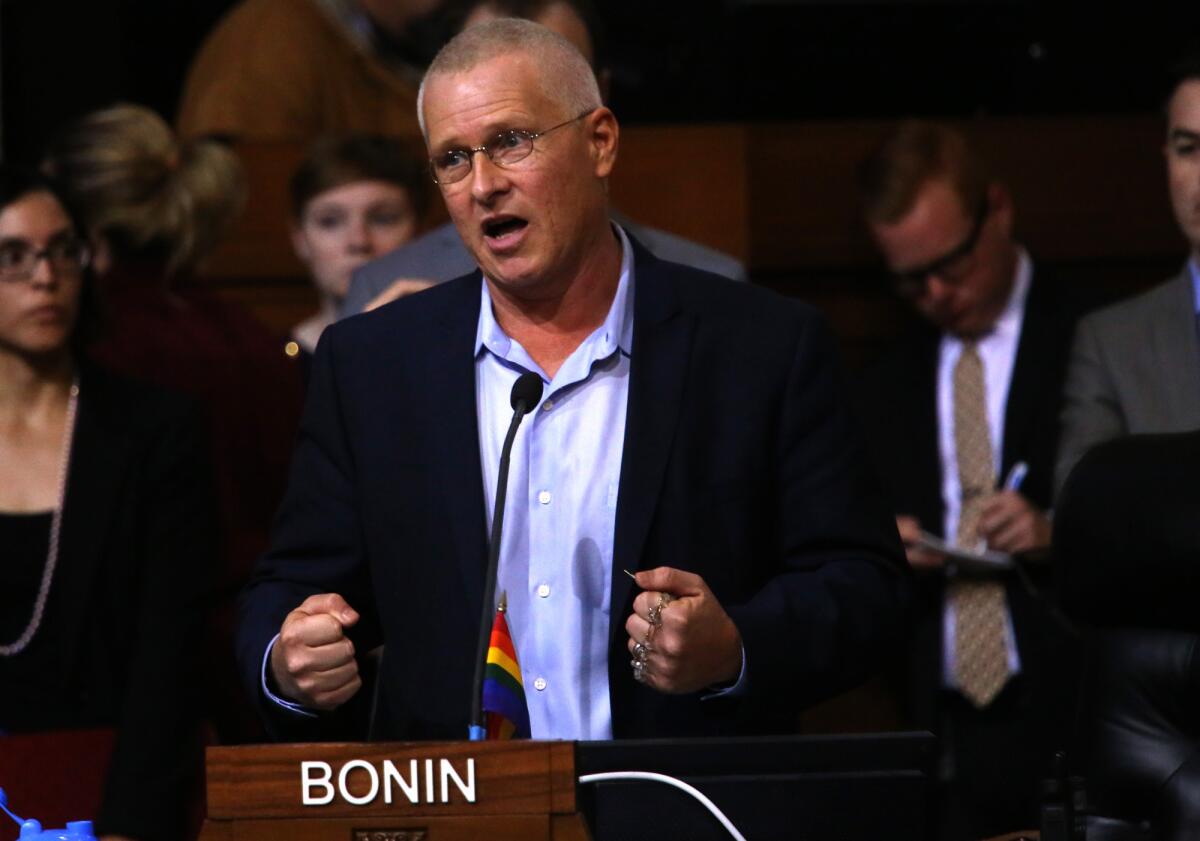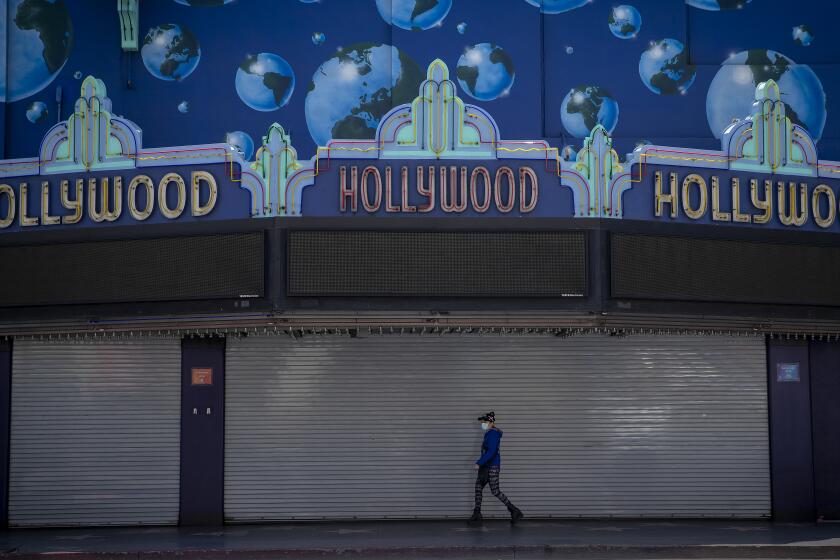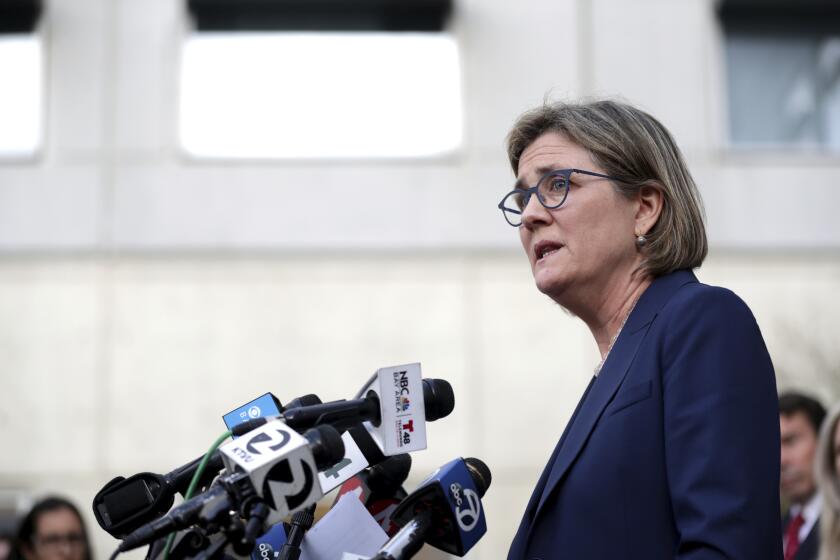L.A. council members balk at broader ban on evictions amid coronavirus, citing legal worries

The Los Angeles City Council balked Wednesday at imposing a ban on evictions that goes farther than the restrictions it has already passed, voting 7 to 6 against a stricter moratorium during the COVID-19 pandemic.
The broader ban proposed by Councilmen Mike Bonin and David Ryu would have prohibited landlords from evicting tenants “except to protect the health and safety of other occupants of the property” during the coronavirus crisis.
The proposal spurred a lengthy and impassioned debate about the legal limits of what the city could do to protect tenants, with some council members publicly disputing concerns raised by the city attorney’s office.
Council members have already barred landlords from evicting people who have been affected by the novel coronavirus, but critics complain that the rules don’t go far enough to help renters, especially those who have little paperwork to later prove that their financial woes are related to the pandemic.
Eviction notices have continued to be issued to some tenants, troubling tenant advocates who argue that an across-the-board ban is needed to prevent disruption for renters.
“It is a common-sense step which will simply help Angelenos understand clearly — without misleading contradictions from their landlord — that they cannot be put out of their home during this pandemic,” West L.A. renter Peter Horton wrote.
Los Angeles County health officials announced 66 more coronavirus-linked deaths Wednesday, bringing the fatality toll to 729 since the outbreak began.
The proposal from Bonin and Ryu was similar to an earlier push for a blanket ban on evictions, which fell one vote short of council approval last month. The city attorney’s office warned, in a confidential memo to the council obtained by The Times, that such a sweeping ban would interfere with private contractual rights and was not likely to survive in court.
Any eviction protections “must be reasonably tied to the pandemic,” the report from Chief Asst. City Atty. David Michaelson stated, and “a broad eviction prohibition that bears no relationship with the emergency would likely not withstand legal challenge.” The report also said that the eviction ban was preempted by state law.
Michaelson said their office had great sympathy for tenants, “but we’re just calling balls and strikes.”
A report from the Los Angeles City Attorney’s Office analyzing proposals to protect tenants.
Bonin instead touted advice from attorneys with the Eviction Defense Network, Public Counsel and other legal advocacy groups, who countered those arguments and said the existing law fails to “discourage the initiation of the eviction process, which sows doubt and confusion leading to renters being harassed and intimidated into leaving their homes.”
The groups contended that L.A. has the legal basis to pursue the broader ban and was not preempted by the state.
Bonin said “it is absolutely something, despite the guidance of our city attorney, that we are empowered to do and should do.”
Michaelson argued that the analysis from the outside groups had left out important details. Councilman Mitch O’Farrell said that Public Counsel had committed “sins of omission” in its legal analysis and “should be ashamed of themselves.” (A Public Counsel attorney said “some confusion” had been caused by the fact that only a small part of its letter was read into the record and reiterated its position that “the city can still go further to protect tenants.”)
“Let’s all get real here and talk about what we can and should do in terms of real policy,” O’Farrell said, calling that proposal and others touted by Bonin and Ryu “pretend measures that we could not ever enforce.”
Many council members, including O’Farrell and Councilwoman Monica Rodriguez, said they were concerned that Angelenos were being offered “false hope” about what the city could legally do to help tenants. Bonin countered that “I don’t think that it’s false hope to try to go big and use our emergency powers.”
“I think it’s false hope to say that we have an eviction moratorium that really isn’t one,” Bonin said.
Seven council members voted against drafting the proposal: Bob Blumenfield, Joe Buscaino, Gil Cedillo, John Lee, Nury Martinez, Monica Rodriguez and O’Farrell. The plan was backed by Bonin and Ryu, Marqueece Harris-Dawson, Jose Huizar, Paul Koretz, and Herb Wesson. Council members Paul Krekorian and Curren Price recused themselves from the vote.
Landlords had voiced alarm about the idea: One landlord who phoned into the Wednesday meeting, who identified herself only as Miss Foster, said she is not eligible for any mortgage relief that now exists.
Patricia Dowd of San Jose, who died Feb. 6, was the first known COVID-19 fatality in the U.S.
“You are asking us to house people for free, without a safety net for ourselves,” she said.
Some protesters, in turn, want the council to go much farther. Tenant activists who have staged drive-by protests outside the homes of Council President Nury Martinez, Mayor Eric Garcetti and Councilmen Bob Blumenfield, John Lee, Mitch O’Farrell and Paul Krekorian are pressing not only for a blanket ban on evictions, but total suspension of rents.
The city attorney’s office wrote in its memo that eliminating all rents would violate the law and require the city to compensate landlords, which “could exceed one billion dollars.”
The council voted Wednesday to back a resolution urging the state and federal government to take action to relieve people from having to pay rent or mortgages during the coronavirus emergency, including a recent bill sponsored by U.S. Rep. Ilhan Omar (D-Minn.).
Councilman Paul Krekorian said, “there is simply no way that we can provide the kind of meaningful relief that will make a difference ... without robust, significant investment by the federal government.”
Bonin and Ryu also pushed Wednesday to halt rent increases in all apartments and other residential rentals in the city. Mayor Eric Garcetti already moved last month to freeze rent hikes for apartments that fall under L.A.’s Rent Stabilization Ordinance — a law that limits annual increases and generally covers buildings built on or before October 1978 — but the move did not affect newer apartments or single-family homes that are rented out to tenants.
City attorneys warned that unless a California law known as Costa-Hawkins was suspended, the city couldn’t stop rent increases in apartments that aren’t covered by the Rent Stabilization Ordinance. If the city pushed forward anyway, Michaelson’s memo said the move would “likely be enjoined by a court through a temporary restraining order.”
The council rejected that move in a 7-to-6 vote, but council members did vote in favor of extending the freeze on rent hikes in rent stabilized units, ensuring that it lasted for nearly a year after L.A.’s emergency order was lifted.
The council also turned down a move to prevent landlords from evicting tenants in the future if they fail to eventually pay back rent that goes unpaid during the COVID-19 emergency — something they have a year to do under the current rules. Landlords would instead have to turn to other means to recoup the money they are owed, such as small claims court.
One member of the Los Angeles Tenants Union who phoned in to the Wednesday meeting argued that many people would struggle to catch up on unpaid rent after the crisis ends.
“How are people supposed to go back to work making the same money that they were before — if they’re lucky — and be paying that back?” Kevin Varzandeh asked.
In its report to the council, the city attorney’s office said that the city was legally preempted from trying to alter the eviction process.
Landlords also pushed against the move: Joel Levine argued in a letter to the council that “we provided our tenants with a service at a price that the tenants agreed to in a lease. It is only fair that we be paid for our work.”
Council members did vote Wednesday to press forward with an emergency rent relief program to assist tenants and to use more than $1 million from discretionary funds controlled by Council President Nury Martinez and Councilman Herb Wesson to start funding the program. Many landlords who opposed the measures proposed by Bonin and Ryu had argued that such a program was a better way to assist struggling renters.
Times staff writers Liam Dillon and Dakota Smith contributed to this report.
More to Read
Sign up for Essential California
The most important California stories and recommendations in your inbox every morning.
You may occasionally receive promotional content from the Los Angeles Times.













